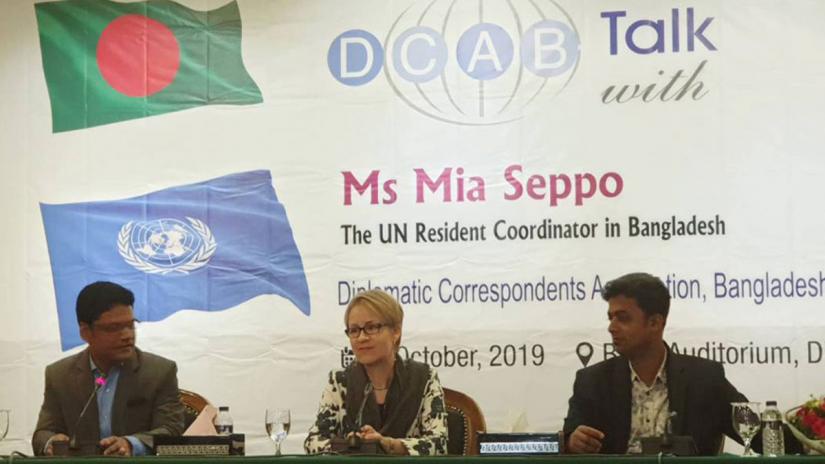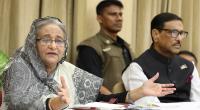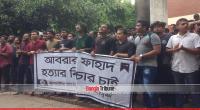 The United Nation (UN) on Wednesday (Oct 9) recognized the international community’s failure to influence Myanmar in taking back the Rohingyas and find a sustainable solution to the Rohingya crisis.
The United Nation (UN) on Wednesday (Oct 9) recognized the international community’s failure to influence Myanmar in taking back the Rohingyas and find a sustainable solution to the Rohingya crisis.
UN Resident Coordinator (UNRC) in Dhaka Mia Seppo said: “UN alone cannot be blamed; there is a collective failure to influence Myanmar.”
She was speaking at a press meet DCAB Talk organized by Diplomatic Correspondents Association, Bangladesh (DCAP) at Bangladesh Institute of International and Strategic Studies (BIISS) auditorium in the Dhaka.
Mia Seppo spoke about how the UN has an unwavering commitment to resolve this crisis, bringing together member states to the table to talk about the crisis and has made progress in accountability on human rights violations by Myanmar.
“It is really important to keep in mind that any solution provided for the Rohingya crisis has to be sustainable.
“Bangladesh is hosting over 1.1 million Rohingyas and most of them entered Bangladesh on Aug 25, 2017 amid military crackdown on Muslims there,” she added.
The solution lies with Myanmar
The main cause of the crisis lie in Myanmar and the solution is there too, said Seppo.
The UNRC said a key objective is creating conditions conducive to voluntary repatriation in safety and dignity. “Still, regardless of when that happens, we’ve to continue to address the impact of this crisis on the Bangladeshi host communities and the Rohingya refugees while they’re here.”
Emphasizing that work needs to be done on both sides of the border, Seppo said they need to continue to seek ways to improve conditions in Rakhine state and what they can do to help Rohingya children, women and men.
The UN has over the past month has seen a rapid change in the narratives about Rohingya with emphasis is on the Rohingya as security risk, as potential extremists and as criminals. “Let’s not forget they’re human beings with dreams and aspirations just like you and me.”
Bangladesh’s impressive development
Seppo highly appreciated Bangladesh's development since independence, calling it a remarkable success story.
She said Bangladesh has been on an impressive development journey since independence in 1971 and the country is expected to reach a significant milestone in the drive to 2030.
Mia Seppo urged authorities to live up to their commitment to review ICT and freedom of expression related legislative frameworks.
Mia said: “To seek the truth, flag inconvenient truths and speak the truth as this is among the preeminent tasks of media in any society. The digital security act, the ICT act and other legislative frameworks makes it harder for some of you to do so. It is important for the authorities to live up to their commitments to review such laws and policies that contribute to shrinking space for freedom of expression, and to ensure an enabling environment for the media to play its key role.”
Seppo touched upon issues related to Bangladesh’s role as a member state of the UN, outcome of the last UN General Assembly, Sustainable Development Goals (SDGs), human rights issues, violence against women, climate change, disaster management and partnership with media.
Diplomatic Correspondents Association, Bangladesh (DCAB) arranged the DCAB Talk with its President Raheed Ejaz in the chair. The DCAB general secretary also spoke at the event.
 National
National
41311 hour(s) 55 minute(s) ago ;
Morning 02:49 ; Friday ; Jul 04, 2025
International community failed to influence Myanmar on Rohingya crisis
Send
Bangla Tribune Desk
Published : 10:27, Oct 10, 2019 | Updated : 10:33, Oct 10, 2019
Published : 10:27, Oct 10, 2019 | Updated : 10:33, Oct 10, 2019
0 ...0 ...
/pdn/
Topics: Top Stories
- KOICA donates medical supplies to BSMMU
- 5 more flights to take back British nationals to London
- Covid19: Rajarbagh, Mohammadpur worst affected
- Momen joins UN solidarity song over COVID-19 combat
- Covid-19: OIC to hold special meeting
- WFP begins food distribution in Cox’s Bazar
- WFP begins food distribution in Cox’s Bazar
- 290 return home to Australia
- Third charter flight for US citizens to return home
- Dhaka proposes to postpone D8 Summit
Unauthorized use of news, image, information, etc published by Bangla Tribune is punishable by copyright law. Appropriate legal steps will be taken by the management against any person or body that infringes those laws.
Bangla Tribune is one of the most revered online newspapers in Bangladesh, due to its reputation of neutral coverage and incisive analysis.
F R Tower, 8/C Panthapath, Shukrabad, Dhaka-1207 | Phone: 58151324; 58151326, Fax: 58151329 | Mob: 01730794527, 01730794528


